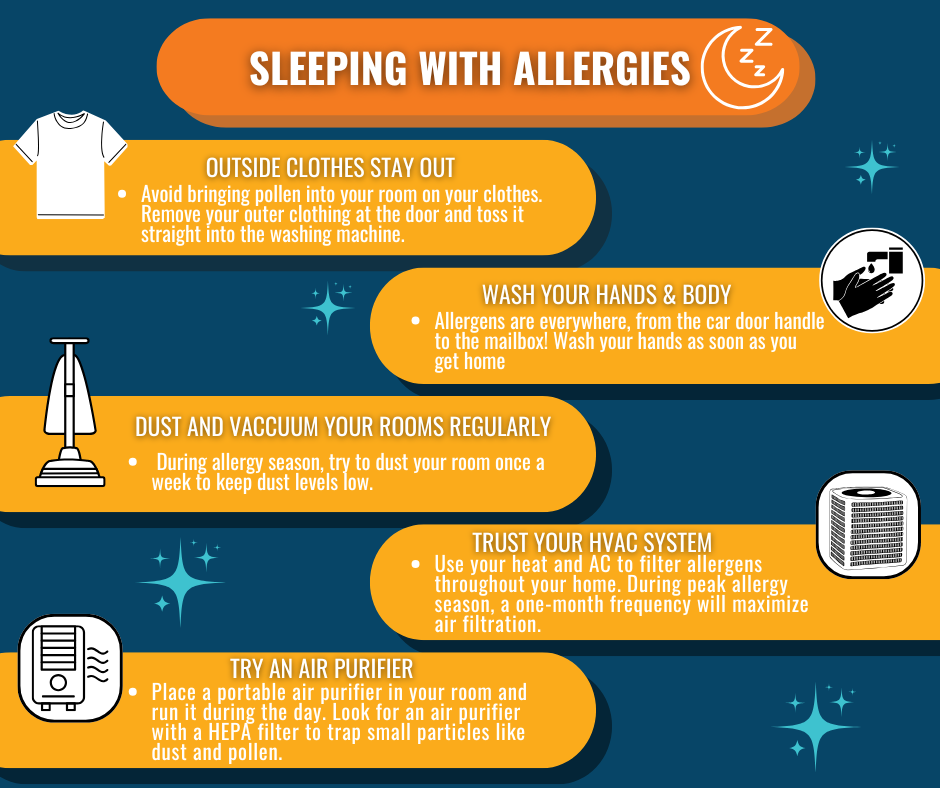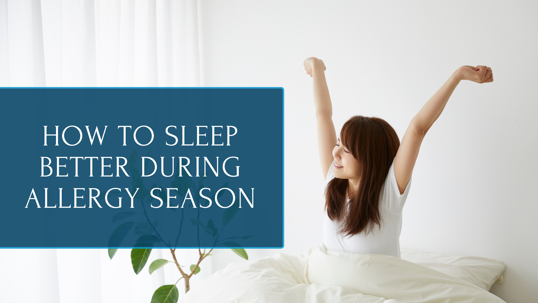Are seasonal allergies preventing you from getting a good night’s sleep? While it’s impossible to maintain an allergen-free home, there are steps you can take to minimize their presence and sleep better. Learn how to sleep better despite the Central Florida allergy season with tips from the Advanced Air Home Services team.

![]()
What Causes Bedroom Allergies?
Bedroom allergens (dust, dander, hair, pollen, mold spores, and more) are indoor or outdoor irritants, but they feel more insidious because your bedroom is your sanctuary.
Roughly a quarter of US adults have seasonal allergies. Inflammation from seasonal allergens like pollen may make you more sensitive to perennial indoor allergens caused by dust, pet dander, or mold. Many adults are allergic or sensitive to multiple allergens, so you may experience allergies at night, even when “seasonal” allergies end.
Try as you might to keep them out, dust, pollen, dander, and mold spores can still get into your home. When your home is no longer a refuge from allergens, it’s a problem.
Read more: How to Improve Home Indoor Air Quality
Allergies and Sleep: Why It’s So Hard to Get Shut-Eye
You might notice your symptoms are worse when you sleep. Allergies tend to be more severe at night due to the increased exposure to indoor allergens and naturally elevated histamine levels. For some individuals, simply lying down can exacerbate symptoms due to airway anatomy.
How to Sleep Better with Allergies
If you’re experiencing sleep-limiting allergies in the bedroom, follow these tips!
- Outside clothes stay out – Avoid bringing pollen into your room on your clothes. Remove your outer clothing at the door and toss it straight into the washing machine.
- Wash your hands and body – Allergens are everywhere, from the car door handle to the mailbox! Wash your hands as soon as you get home, and avoid touching your mouth, nose, and eyes until your hands are clean. Take a shower if you’ve spent a lot of time outside to remove allergens from your hair and skin.
- Dust and vacuum your room regularly – Bedrooms typically gather a lot of dust and dander because we spend a lot of time in them, and there’s usually little airflow or ventilation. During allergy season, try to dust your room once a week to keep dust levels low.
- Trust your HVAC system – Use your heat and AC to filter allergens throughout your home.
Replace your HVAC’s air filter every one to three months. During peak allergy season, a one-month frequency will maximize air filtration.
You can check your owner’s manual or contact our team to see if a HEPA filter is compatible with your system.
- Try an air purifier – Place a portable air purifier in your room and run it during the day. Look for an air purifier with aHEPA filter to trap small particles like dust and pollen.
Does Sleeping with a Humidifier Help Allergies?
Sleeping with a humidifier may alleviate allergy symptoms for some individuals, but it’s far from a universal solution. High humidity levels may worsen allergies, especially for people sensitive to mold and dust.
What Is the Best Temperature and Humidity for Sleeping?
The EPA recommends setting your thermostat between 60 and 67 degrees Fahrenheit and your home’s humidity between 30% and 50%.
Sleep Better with Help from our Daytona Beach Area HVAC Experts
Enhance your home’s comfort and avoid unexpected HVAC problems with the help of Advanced Air Home Services. We’re proud to be your trusted HVAC experts in Edgewater and the greater Daytona Beach area. Count on our technicians for reliable HVAC service when you need it most!
Contact us online or call 386-260-2330 to schedule an appointment!

